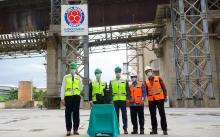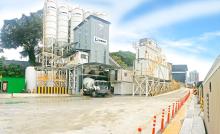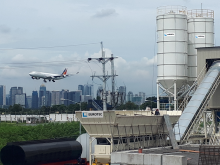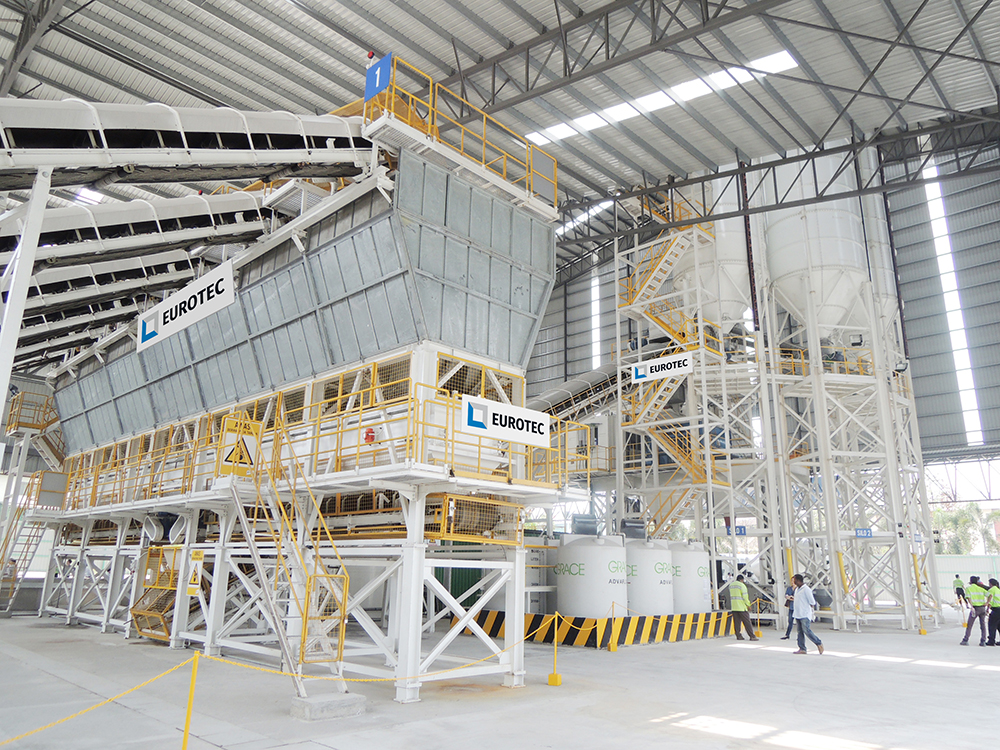
While the concrete industry continues to support global infrastructure development, there is also pressure across the globe for it to demonstrate increasing sustainability and environmental care.
In the construction equipment segment, Lintec & Linnhoff says it is driving improved sustainability in construction materials supply with several innovative designs aimed at boosting productivity while also limiting adverse environmental impact.
One example in Kuala Lumpur, Malaysia, saw a Eurotec MZP200 ready-mix concrete batching plant installed within an enclosed warehouse in the Chan Sow Lin district as part of a sustainability drive in 2014. It was a design idea that proved so successful, other companies in the country adopted the design, leading to significant improvements in local air quality.
“Seven years ago, this was the only plant in Malaysia with the enclosed design, but it quickly caught the attention of the local construction industry who were all impressed with the reductions in noise and dust emission levels it delivered,” said R. Sakthi, CEO at Lintec & Linnhoff Concrete. “This greatly improved air quality and helped the Malaysian industry take another step towards more sustainable infrastructure development.”
Similar to the other ready-mix concrete plants in the MZ series, the Eurotec MZP200 features a modularised structure for easy and quick installation and maintenance. The project in Chan Sow Lin was completed inside an almost totally enclosed warehouse, with the plant’s six aggregate bins, multiple tall cement silos, centre-discharge conveying system and static aggregates ground-feeding conveying system all assembled within the giant structure. This way, dust and cement are contained within the compound, rather than polluting the external environment and nearby residential areas.
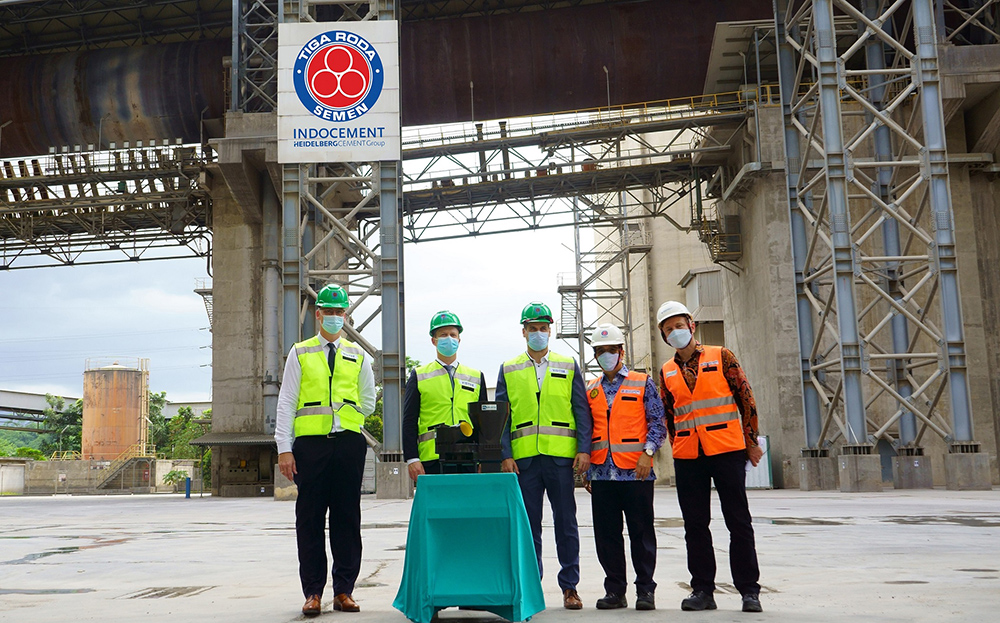
The cement batch plants worked for 10 hours per day, producing up to 4.5m³ per batch or up to 200 m³/hour of ready-mix concrete for construction and infrastructure projects in Kuala Lumpur and the Klang Valley. Despite this, the Eurotec MZP200 concrete batch plant was notable for the reduced noise and dust.
By March 2015, the plant achieved another milestone when it was awarded SIRIM QAS International’s ISO 14001:2004 certification in the Manufacturing of Ready-Mix Concrete category.
“Our engineering detail allows the MZ batching plant model to fully reclaim returned concrete by separating the sand, aggregates and water, and then recycle them back into the batching process,” said Sakthi.
The combination of an enclosed warehouse for the concrete plant, plus an operational capacity to fully reclaim returned concrete is a perfect design for urban locations. Increasingly in Asia there is greater attention being paid to delivering better air quality, with the Asian Development Bank even launching a Clean Air for Liveable Cities series to support the initiative.
At the same time, demand for greener construction continues to rise, and interestingly this is being supported by end users, with recent research showing that most Asia-Pacific companies would pay higher rent to lease a building with stronger green credentials.
As this trend continues, Lintec & Linnhoff says that contractors will increasingly look for innovative designs and advanced technology in their mission to produce good quality concrete that can help them deliver more sustainability-certified buildings.
With an extensive range of customisation options to suit the requirements of any major project, the Eurotec MZ series can be designed with one mixer and two discharge chutes to reduce the waiting time of mixer trucks, thereby increasing productivity and reducing fuel use. The energy consumption – along with wear and maintenance costs – of the batch plant is also reduced via the use of computer-controlled twin-shaft mixers that ensure high accuracy. Operating at high torque, their three-dimensional mixing motions generate a higher consistency of concrete.
“This project showed that it is entirely possible for concrete batching plants and local residents to co-exist peacefully, as long as proper attention in detail is paid to the environmental impact,” concluded Sakthi.
In Indonesia, Denmark-based FLSmidth is helping cement manufacturer PT Indocement Tunggal Prakarsa move from coal to alternative fuels.
Heidelberg-owned Indocement has ordered a full alternative fuels solution to replace coal. Enabling the use of municipal waste and biofuels, FLSmidth is supplying a MissionZero flagship product, the FLSmidth HOTDISC-S and feeding systems.
The FLSmidth-Indocement contract was signed at a ceremony in Citeureup Plant, Indonesia, on 22 November in the presence of Minister of Foreign Affairs of Denmark, Jeppe Kofod.
As the cement industry transitions away from carbon-dioxide-intensive fuels such as coal, the introduction of waste-to-energy solutions is becoming increasingly attractive – environmentally and financially. Particularly in Indonesia, challenges with landfilling and waste management have led the government to encourage the cement industry to be part of the solution.
Operating three cement plants with a total capacity of nearly 25 million tonnes per year, Indocement is one of Indonesia’s leading cement producers. At its site on the outskirts of Jakarta, FLSmidth will deliver the new HOTDISC-S, which can turn a wide range of alternative fuels, including municipal waste and biofuels, into a reliable heat source for its SLC Calciner.
“It’s a growing challenge in many parts of the world, with municipal waste accumulating as authorities struggle to find effective answers,” says Carsten Riisberg Lund, cement industry president, FLSmidth. “The cement industry is well-positioned to be part of the solution, and we see more and more cement producers successfully replacing fossil fuels with alternative solid fuels as an energy source.”
Christian Kartawijaya, president director of Indocement, states: “As a vertically integrated cement producer, Indocement has a huge responsibility to the community we operate in, and our customers expect us to do everything in our power to minimise the use of coal.
“The new, redesigned FLSmidth HOTDISC is a perfect match for our SLC Calciner, but, more importantly, it offers us flexibility as we increase the use of alternative fuels.”
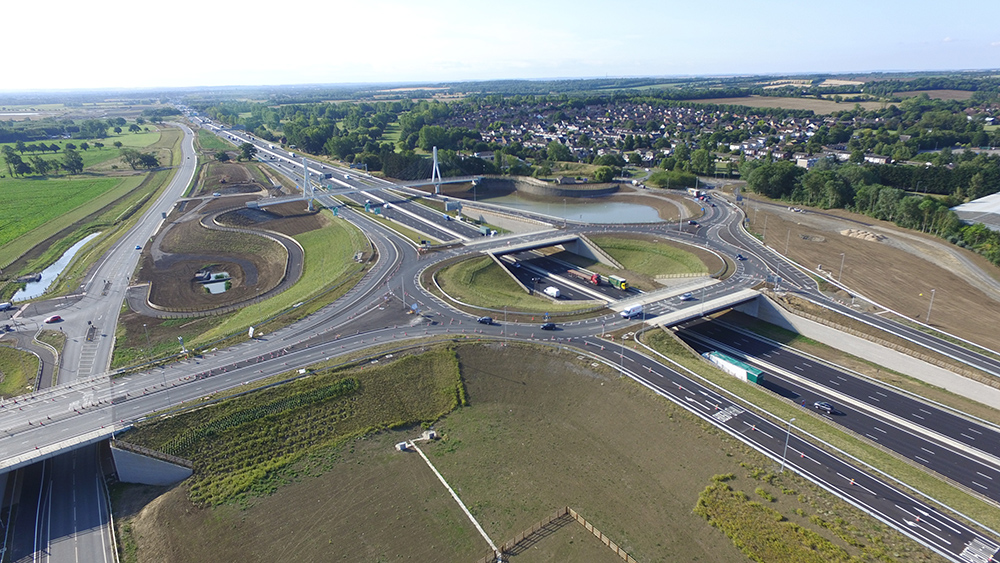
The ability to replace most calciner fuel without compromising on energy efficiency or kiln performance makes the FLSmidth HOTDISC a flagship offering in FLSmidth’s MissionZero programme, which is the sustainability ambition to enable cement producers to operate plants at zero emissions by 2030.
The Portland Cement Association (PCA) has announced an ambitious roadmap to achieve carbon neutrality across the US cement and concrete industry’s value chain by 2050. Given the significant role of cement in society and anticipated infrastructure development, the PCA says it is a critical step that the industry acts now to further reduce greenhouse gases (GHGs) and create sustainable building solutions in the decades to come.
“Cement and concrete have been pivotal in building resilient, durable and sustainable communities that enable people to live safe, productive and healthy lives via structures that withstand natural and man-made disasters,” said PCA president and CEO Michael Ireland.
The PCA Roadmap outlines a portfolio of reduction strategies and immediate opportunities across the various phases of the built environment: production at the cement plant, construction including designing and building, and everyday infrastructure in use. Across this full cement-concrete-construction value chain, the roadmap recognises five main areas of opportunity: clinker, cement, concrete, construction and carbonation (using concrete as a carbon sink). Each phase of the value chain is integral to reaching the goal and can unlock unique and specific pathways to carbon neutrality, including actions such as reducing CO2 from the manufacturing process, decreasing combustion emissions by changing fuel sources and shifting toward increased use of renewable electricity.
As Tensar International’s main precast concrete supplier, Anderton Concrete supports the manufacture of its market-leading TensarTech TW3 and TW1 wall systems for the UK and Ireland markets.
A recent example of the partnership’s work is the £1.5bn National Highways, A14 Cambridge to Huntingdon Improvement Scheme, which saw the supply of 10,000m² of TensarTech TW3 across 11 separate structures.
One of the most heavily used road sections is between Huntingdon and Cambridge, which links the A1(M) motorway to the North of England and the M11 Motorway to London. The A14 is a crucial national road link for the West Midlands and East Anglia. It is also a part of the Trans-European Transport Network, connecting the M1 and M6 motorways to Felixstowe and other key ports and commercial locations. This segment of road carries around 85,000 vehicles a day, a quarter of which is HGV traffic - a statistic that surpasses the HGV national average expectation on roads at just 10%.
The National Highways A14 project was developed to relieve congestion, increase capacity and make journey times more reliable while supporting regional and national economic growth.
In addition to widening and making improvements to 34km of the A14, the project included the construction of the new 20km Huntingdon Southern Bypass, which was designed to divert large volumes of traffic off the A14. This included implementing upgrades to the A1, Huntingdon town centre and local roads, with better connections for horse riders, cyclists and pedestrians.
The TensarTech TW3 reinforced soil retaining walls were built along key parts of the A14 to quickly and economically construct wing walls for new overbridges. Anderton Concrete’s Keystone product was specified over conventional reinforced concrete due to its robust and flexible nature, which accommodated the predicted settlements expected during construction and for several years after completion.
Anderton Concrete says that, as part of its commitment to producing the highest standard in product quality and compliance, each concrete-faced modular block, and incremental-panel reinforced soil retaining walls are independently accredited in the form of complete BBA HAPAS certifications. For the A14 project, the solutions also met the highly stringent technical approval (AIP) by National Highways.
“Our joint-progressive approach to the design and manufacture of retaining wall systems has resulted in improved cost efficiencies and ease of construction for the entire infrastructure sector,” says Craig Roberts, team leader, reinforced soil structures, Tensar International.

